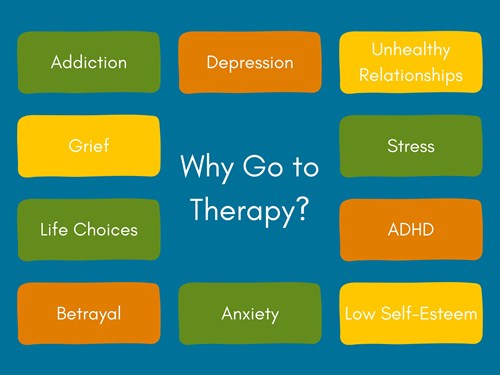People are often ashamed to see a therapist because they feel like everyone else has everything together and seeing a therapist means they are weak. In reality, people from all walks of life struggle in some way or another—especially when it comes to their mental health. It is very common for people to see a therapist on a regular basis if they have been struggling with anxiety or major depression. Therapy is not something that should be hidden away. Not only does therapy help you deal with adversities in a healthy way, but talking about it inspires others to seek help. Therapy is something you can be proud of.
Seeing a therapist doesn't mean there is something wrong with you; it means your life could be better and you care about yourself enough to seek help.
Getting Over The Stigma
More and more people see a therapist, or talk to someone who is trained to listen and guide them in making decisions that are right for them. Yet, while attitudes about therapy have changed over the years, the stigma remains.
There is a lingering misunderstanding that therapy is only for people with mental illness. Some people think seeing a counselor or therapist means you are crazy. This is not true. It doesn't matter what your background is; it doesn't matter how smart you are; you can improve your well-being and life by seeing someone who is trained to help people overcome life's challenges. Therapy is for everyone! We all need a little help with life sometimes.
- You’re not “crazy” because you go to therapy
- There's nothing wrong with you
- You are not your mental illness
- You are not alone
- Everyone needs help sometimes
- There is no reason to be ashamed of asking for help
- It feels good to talk about your problems with someone who's trained to help you!
Going to therapy, whether it is therapy for adults or therapy for children and teens, is nothing to be ashamed of. And if you are struggling with mental illness, staying quiet about it can lead to more serious problems later on. Talk to someone you trust and see a professional!
Don't let the stigma hold you back. If you're concerned about something or just want a place where you can share your thoughts and feelings without judgment, schedule an appointment with someone who's trained to help people with issues like yours. You'll be surprised how much it will benefit you.
Many people start going to therapy because they hear a loved one or a friend talking about how much they appreciate their relationship with their therapist. We all long to be heard and understood. When you go to therapy and are proud of it, you can inspire others to get the help they need to feel better.

You Are Not Alone. How Many People Go To Therapy?
More people go to therapy than you might think. Of course, people don't really go around talking about their therapy sessions. According to statista.org, 41.4 million people in the U.S. saw a therapist in 2020. That is about 1 in 8 people!
Counseling and therapy can help people feel like they 're not alone. People who have gone to therapy say it helped them feel understood, listened to, and powerful in their lives. This is something we all want to experience and therapy is a great option to satisfy this need.
Who Goes To Therapy? Who Is Therapy For?
Therapy is for anyone who wants to improve their life and relationships. Therapy can be specialized for mental illnesses such as anxiety, depression, bipolar, schizophrenia, ADHD, etc. It can also be helpful for people struggling with grief, stress, poor life choices, unhealthy relationships, low self esteem/confidence, betrayal, addiction, etc.
Therapy is not only for the mentally ill or people who have major issues going on in their lives. Everyone needs a little extra help at some point in life.
Who Cares What Others Think. Therapy Is For You!
Everyone faces challenges. The best way to deal with them is to talk to a trained professional about what's on your mind. In therapy, you can talk to someone who will listen to how you feel without judgment. A friend may be there for you, but they may not be able to give you their full support because they have their own things going on. Therapists dedicate their time to you and make sure you feel heard. It's just like talking to a good friend, only the person is highly trained and knows how to detect patterns and provide you with tools to help you live a healthier and more fulfilled life. Therapists spend years learning specialized therapeutic techniques and will be able to offer you something beyond a shoulder to cry on. They will do everything they can to understand you so they can help you understand yourself better.
Sometimes speaking to someone about what’s going on in your life can be hard, because not everything has an answer or solution right away. But having someone sit with you and guide you through your challenges can be so helpful. To say that “therapy is a waste of money" is a disservice to you and everyone who has ever spoken about what’s going on in their head. Your therapist isn't a fixer of people, they’re there to help you figure things out at your own pace. Imagine having someone on your team who is rooting for you and is fully committed to your well-being. That's what a therapist can be for you.
Going to Therapy Is a Sign of Strength, Not Weakness
Going to therapy means you decided to take control of your life. It means you decided to change your life for the better and you want someone on your side who can help you become the best version of yourself. Making the decision to go to therapy is a huge step towards well-being. Taking that step and requesting support takes a lot of courage—it is something you can be proud of.
If you feel like your life is in a rut or that you could simply use another person's perspective, consider therapy. If you are facing challenges with you or your family that you simply cannot solve on your own, consider therapy. Seeing a therapist means you are actively working towards being a better person, caring about yourself more, and making healthy decisions for yourself.
If you are interested in seeking support, contact Dakota Family Services today to discuss your options.



